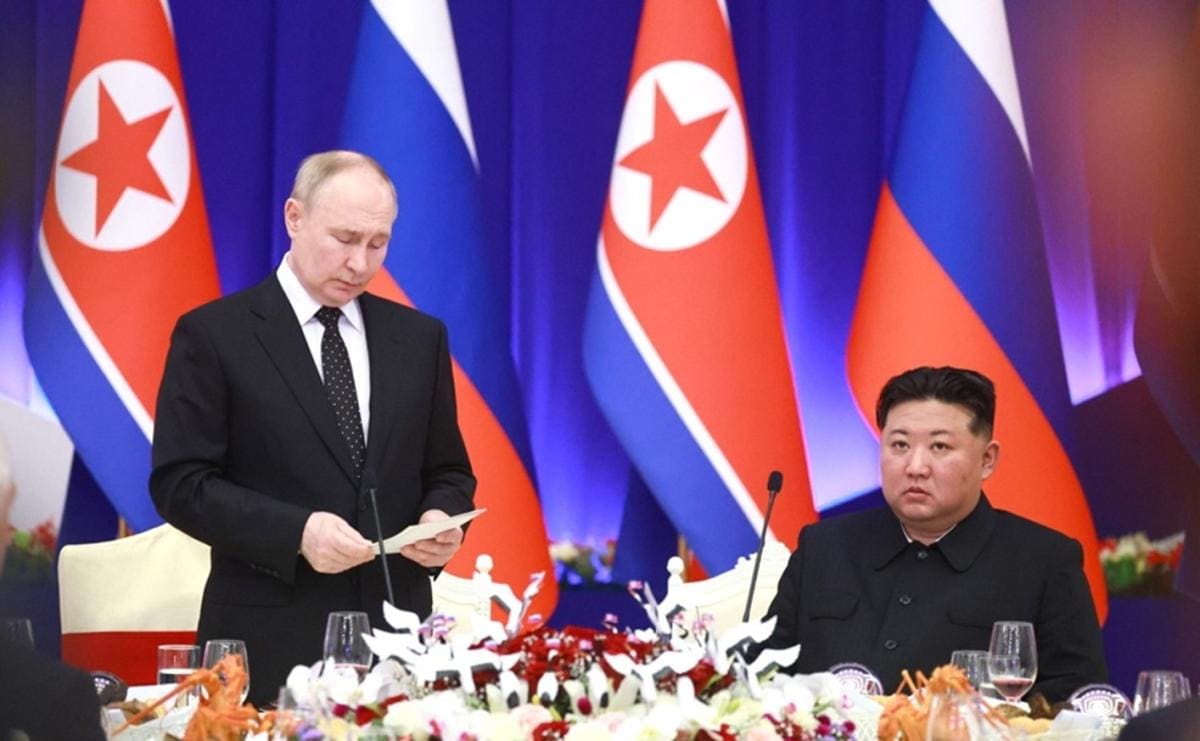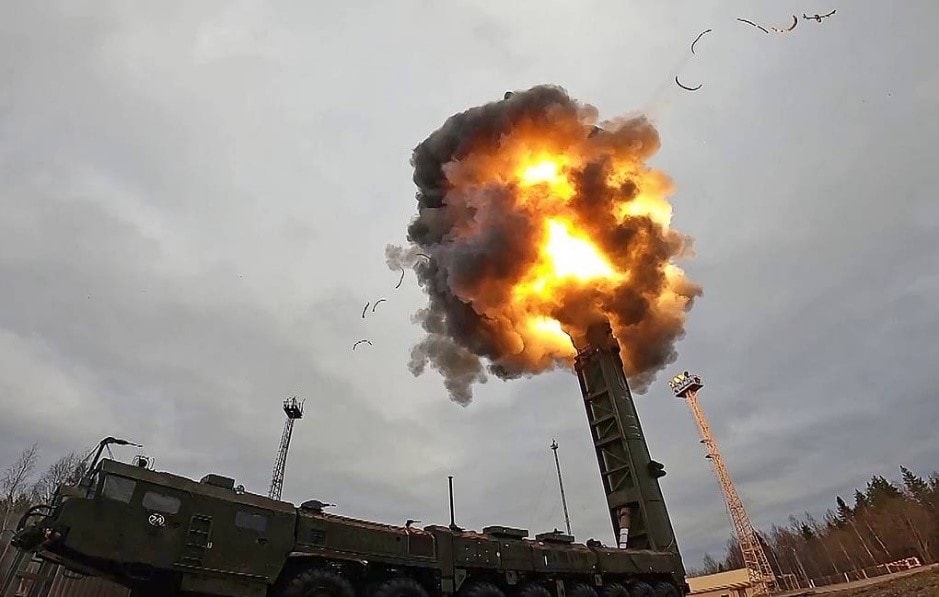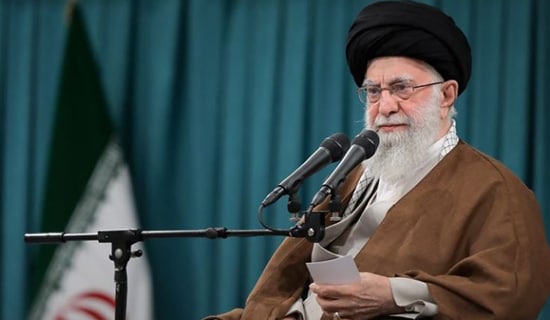In mid-June 2024, analysts had turned to Russian President Vladimir Putin's visit to North Korea, his second in 25 years. Putin remains the only Russian leader to have ever visited the country. Even in Soviet times, Nikita Khruschev's planned visit was cancelled in 1959.[1] Putin and North Korean leader Kim Jong Un expressed great joy and happiness concerning the overall state of Russia-North Korea relations and signed a Comprehensive Strategic Partnership Treaty that, atop of routine assurances of full and total solidarity against the "neo-imperialist forces," contains an obligation for both parties to intervene militarily in case the other party is attacked by any third country.[2]
The treaty, Russian observers argue, cannot be considered unique, since "it resurrects the 1961 alliance between the Soviet Union and North Korea that obligated both sides to come to the aid of the other if attacked." Hence, "the text of this clause in the new 2024 treaty is simply copied from its 1961 counterpart with minimal changes."[3] Nevertheless, the treaty reassures the North Korean leadership of Moscow's full support. It is also worth noting that the circumstances, under which it was signed, look exceptional, since Russia needs North Korea even more than North Korea needs cooperation with Russia.

Reception hosted by the chairman of state affairs of the DPRK in honor of the president of Russia. (Source: Kremlin.ru)
Putin's 2000 Visit To North Korea
Since the collapse of the Soviet Union, Russia's relations with North Korea have never been considered important, as the ailing nation remained a global pariah and was once again put under a different sanctions regime. The trade between the two countries was almost negligible and remained so whatever the political ties were.
The Putin's first visit in 2000 had, to my mind, two objectives:
1. Russia at that time considered itself a civilized Western power interested in promoting the Western agenda among former Soviet satellites. After talks with Kim Jong Il, Putin declared that both leaders agreed that North Korea would terminate its missile program in exchange for Russian assistance in launching its satellites from Baikonur or Plesetsk.[4]
2. Putin realized that the Russian public was tired of "ruining" the Soviet heritage and might favor a reestablishment of relations with former Soviet allies. Putin became famous for also visiting Cuba and Libya during the initial stage of his reign.
Yet not much was achieved, as North Korea had no intention of terminating its missile program (some parallels can be made with President Trump's dealings with Kim Jong Un,[5] as the American leader dreamt of pacifying the North Korean regime and turning it into a reliable partner, but realized quite soon that this task cannot be completed). Furthermore, Russia soon started to become even more pro-Western in maintaining tight relations with the rogues in Pyongyang. Later Moscow even joined the UN sanctions regime against North Korea in 2010 under President Dmitry Medvedev.[6]
Moscow tried to make some business deals with Pyongyang that have been allowed under sanctions as it bought some mineral resources and sold foodstuffs and oil, which were considered vitally needed goods exempted from any restrictions.[7] Nevertheless, the overall trade remained limited till the start of Kremlin's full-scale aggression against Ukraine: in 2013, the trade volume was assessed at $93 million, and in 2021 at only $45,000, before the customs posts on the Russia-North Korea borders were closed in October 2021 because of the complete absence of any transiting goods.[8]
Putin's 2024 Visit To North Korea
The war, however, changed almost everything.
Four months after the war started, North Korea officially recognized the Donetsk and Luhansk "Peoples' Republics," which at the time were still not formally incorporated into the Russian Federation, becoming the first nation to do so after Syria, a loyal satellite of Putin's government.[9]
Later in 2022, as the Russian army started experiencing mounting difficulties at the front and faced increasing shortage in ammunition, the Kremlin sought ways and means of buying shells and even rounds from North Korea's vast military arsenals. In that period, the North Korean denied having supplied weapons to Russia.[10]
North Korea has been fully dependent on the Soviet Union for decades and developed its military production on the basis of the Soviet technologies and standards, which are still used by the Russian army (most notable example in this case are 152mm shells which have been produced by the Soviet Union and its satellites during the Cold War, but by the 2000s were abandoned by almost all countries in the world, including China, in favor of the NATO-adopted 155mm ones). First, leaks about North Korea selling these shells to Russia emerged as early as September 2022,[11] and during 2023 the estimates of the deals were revised upward many times, first reaching 1.5 million and later exceeding 4.8 million shells (all these assessments were made by tracing trains and container moves across the border), which equals approximately the entire Russian shell production for 2023.[12]
The larger figure appears to be correct, and such supplies gave an important lifeline for the struggling Russian army, since the domestic shell production was unable to catch up with the current requirements at least until the end of 2023 and many experts expected an acute shortage of shells that would force the Russian troops to "soften" their grip on Ukraine either by the end of 2022 or in early 2023.[13] The shipments of cartridges were also quite significant – some estimates put them at several billion items. Besides of all this, North Korea continues to supply the Russian army with some less important military goods from its vast reserves, including clothing, etc.
After a full year of such cooperation, Kim Jong Un arrived in Russia in September 2023 visiting the Russian Far East,[14] including the newly built Vostochny launch site, meeting with President Putin, regional governors, and ministers of defense and natural resources. Putin then explained their summit at Vostochny by the "great interest Kim Jong Un expresses for the development of missile technologies" fueling suspicion that Russia was preparing itself to engage with the North Korean missile program. It seems that there were grounds for such concerns as Russia had reportedly sent its missile technology specialists to Pyongyang almost immediately after the Putin-Kim summit,[15] and by the start of 2024 the evidence appeared that several types of North Korean Hwasong-11 missiles had arrived in Ukraine and were used to strike both military and civilian targets.[16]
Western policymakers condemned their use as clear proof of Russia's violation of international sanctions that it has previously agreed to. Taking all this into account, one should be not surprised that President Putin accepted Kim's invitation to visit North Korea, since Russia is temporarily dependent from the pariah state, and this dependence may last, since analysts still believe Russia's military production capabilities remain limited.
How Far Can The Russian-North Korean Cooperation Advance?
The results of the recent developments should be called extraordinary.
Various experts estimate the volume of Russia's imports from North Korea at between $1.8 and $2.4 billion in 2023, meaning the turnover of bilateral trade exceeded that of 2021 by at least 50,000 times, representing the fastest growing trade relationship of our times. Russia profited both from arms trades and from exports of its cereals, oil, oil products (in amounts not allowed under the UN sanctions), various foodstuffs, machinery, and engineering services.[17]
The impact of the renewed cooperation was so significant that the North Korean economy grew for the first time in more than a decade, accelerating to 3.1 percent in 2023 and, most probably reaching 4-5 percent growth rates this year (even the official statistics do not mention massive growth of exports to Russia).[18] There is little doubt that cooperation between two rogue states will develop fast: With Russia, North Korea has found a unique client for its military-industrial complex, and Russia might be considered a good ally in Pyongyang and some counterweight to China. Here it should be mentioned that there is no chance for Moscow to compete with the Chinese in being North Korea's best friend – the North Korean media depicts Russia not so much as an strategic ally than rather as a "fellow traveler [попутчик],"[19] a nation that can help North Korea's paramount leader to achieve some goals he seeks, but a nation that cannot be considered ideologically coherent with the land of Juche.[20]
How far can the Russian-North Korean cooperation advance? This is the most important question for all analysts today. I would say that some progress is inevitable: Russia will continue to buy locally produced armaments just to sustain the established ties which are now highly valued by the Kremlin (after all, North Korea remains the single country that supports all Russia's policies in Ukraine and matches Russian officials' critique of "American imperialism").
The Russian leadership may still see cooperation with Pyongyang as a means of signaling to Beijing as Moscow is becoming more unhappy with its moves, especially those aimed at respecting the Western sanctions against Russia. Moreover, in coming months both parties may also reach agreements on using North Korean workers in the Russian Far East regions and even on sending its soldiers to the frontline. They may not be engaged in active combat, but only supporting tasks; Russia has often enlisted foreign citizens in its army, but this was done only on an individual basis and had caused public outcries in several countries.
For all this, Russia will reward Pyongyang with opening additional access to commercial projects in the Russian Far East, supplying most needed goods, assisting North Korea in its missile program, and supporting it at the international arena – e.g., challenging the existing multilateral sanctions regime.
Conclusion
Nevertheless, it seems there are at least two obstacles that might challenge the Russia-North Korea friendship. On the one hand, it is the reaction of neighboring nations, most notably Japan and the Republic of Korea (ROK), which seem to be extremely disturbed with the alliance between Putin and Kim Jong Un. Russia already felt some of the effects as, for example, South Korean shipbuilders cancelled contracts in supplying the Russian LNG development projects with new tankers. It seems that this is only the beginning, and Moscow will turn both nations into its enemies if it decides to strengthen its ties with the North further.[21] At some point, China may also become unhappy with the current trends since it is considered North Korea's patron, and the pressure will grow from both the U.S. and Europe, conditioning relations with Beijing by restraining Pyongyang's ties with Moscow. Up to today, I should note, the U.S. has only threatened that North Korea "will pay a price" for arms deals with Russia[22] but has done nothing that would prove its determination.
On the other hand, there is little doubt that the Russia-North Korea alliance is a situational one caused exclusively by the trap into which Russia has gotten with its war with Ukraine – and therefore the cooperation between the two countries depends heavily on the perspectives of this war. Should Ukraine and Russia agree to an armistice and/or a peace accord, the overall basis for the current relations may disappear: Russia will continue to turn into an autarkic economy with its military complex leading the way and considering the North Korean producers as its main competitors. President Putin already promised Russian industrialists that the military orders will not be cut significantly for many years to come.[23] So, if the war terminates, the need for North Korean ammunition disappears almost immediately.
But for all these developments, some time would be needed, and these days the cooperation between the two nations seems to be at its height. However long it may last, it could cause a lot of problems for East Asia and the world since North Korea will definitely advance its missile program and develop other military capabilities; its leadership will realize that its country's militarization can produce juicy deals and therefore should be advanced contrary to the feeling that the civilian branches of the national economy should get some priority; and, after all, Pyongyang will solve some of its most acute economic and financial problems making the existing regime more stable, and easing the overall pressure for reforms. To conclude, I would argue that the friendship between two irresponsible dictators, however occasional, short, and uneasy it might appear, cannot produce anything good for either their own nations or for the world.
*Dr. Vladislav Inozemtsev is the MEMRI Russian Media Studies Project Special Advisor, and Founder and Director of the Moscow-based Center for Post-Industrial Studies.
[1] Topwar.ru/226360-sssr-i-kndr-druzhba-edva-ne-zavershivshajasja-razryvom.html, September 25, 2024.
[2] Kcna.kp/ru/article/q/642528cc5ab43213fbe8830604f641b0.kcmsf
[3] Carnegieendowment.org/russia-eurasia/politika/2024/06/russia-dprk-allience?lang=en¢er=russia-eurasia, June 28, 2024.
[4] Kremlin.ru/events/president/transcripts/24172, July 19, 2000.
[5] Cnas.org/publications/commentary/stop-calling-the-donald-trump-kim-jong-un-relationship-a-bromance
[6] Kommersant.ru/doc/1346011, March 30, 2010.
[7] Forbes.ru/biznes/472007-ugol-zen-sen-i-trudolubivye-rabocie-cto-i-komu-eksportiruet-severnaa-korea, July 20, 2022.
[8] Rtvi.com/news/tovarooborot-s-kndr-na-dalnem-vostoke-polnostyu-prekratilsya/, October 25, 2024.
[9] Rtvi.com/news/tovarooborot-s-kndr-na-dalnem-vostoke-polnostyu-prekratilsya/, October 25, 2024.
[10] 24tv.ua/ru/oruzhie-rossii-kndr-otkreshhivaetsja-ot-snabzhenija-oruzhiem_n2162964, September 22, 2022.
[11] Nytimes.com/2022/09/05/us/politics/russia-north-korea-artillery.html, September 5, 2022.
[12] Dw.com/ru/severnaa-korea-peredala-rossii-bolee-1-mln-artillerijskih-snaradov/a-67278332, November 1, 2023; Time.com/6988568/north-korea-russia-artillery-shell-south-korea-defense-minister/, June 14, 2024.
[13] https://edition.cnn.com/2024/03/10/politics/russia-artillery-shell-production-us-europe-ukraine/index.html, March 10, 2024; Currenttime.tv/a/nuzhny-tehnologii-oborudovanie-spetsialisty-kotoryh-poprostu-net-eksperty-o-buduschem-snaryadnom-golode-rossiyskoy-armii-/32021555.html, September 7, 2022.
[14] Interfax.ru/russia/921186, September 17, 2023.
[15] Rbc.ru/politics/13/09/2023/65019b059a794748ff99e71a, September 13, 2023.
[16] Currenttime.tv/a/severnaya-koreya-vyhodit-za-ramki-sanktsiy-pravda-li-chto-nachala-obstrelivat-ukrainu-raketami-i-snaryadami-proizvodstva-kndr-/32762706.html, January 5, 2024; Golosameriki.com/a/russia-shipping-fuel-to-north-korea-above-un-cap---white-house/7595484.html, May 2, 2024.
[17] Golosameriki.com/a/russia-shipping-fuel-to-north-korea-above-un-cap---white-house/7595484.html, May 2, 2024.
[18] Expert.ru/news/ekonomika-kndr-v-2023-g-vernulas-k-rostu-vvp-pribavil-3-i-1-protsenta/, July 26, 2024.
[19] Carnegieendowment.org/russia-eurasia/politika/2024/06/russia-dprk-allience?lang=ru¢er=russia-eurasia, July 24, 2024.
[20] See MEMRI Special Dispatch No. 11415, Russian Philosopher Dugin On Russia-North Korea Relations: Russia's Needs 'Juche,' The State Ideology Of North Korea, June 24, 2024.
[21] Secretmag.ru/news/koreiskaya-verf-otkazalas-stroit-tankery-dlya-postavok-rossiiskogo-gaza-25-05-2022.htm, May 25, 2022.
[22] Edition.cnn.com/2023/09/05/asia/us-warns-north-korea-russia-weapons-intl-hnk/index.html, September 5, 2024.
[23] Kommersant.ru/doc/6510907, February 15, 2024.








